 MyDogBreeds
MyDogBreeds Welsh Springer Spaniel is originated from United Kingdom but Red Heeler is originated from Australia. Both Welsh Springer Spaniel and Red Heeler are having almost same height. Both Welsh Springer Spaniel and Red Heeler are having almost same weight. Both Welsh Springer Spaniel and Red Heeler has almost same life span. Both Welsh Springer Spaniel and Red Heeler has almost same litter size. Welsh Springer Spaniel requires Moderate maintenance. But Red Heeler requires Low maintenance
Welsh Springer Spaniel is originated from United Kingdom but Red Heeler is originated from Australia. Both Welsh Springer Spaniel and Red Heeler are having almost same height. Both Welsh Springer Spaniel and Red Heeler are having almost same weight. Both Welsh Springer Spaniel and Red Heeler has almost same life span. Both Welsh Springer Spaniel and Red Heeler has almost same litter size. Welsh Springer Spaniel requires Moderate maintenance. But Red Heeler requires Low maintenance
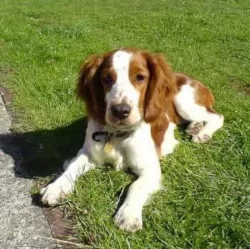 The Welsh Springer Spaniel is thought to be an old Land Spaniel similar to the English Springer Spaniel. They were pretty mush an unknown breed until they won a string of dog trials and became more popular. Following this surge the breed was recognized by the UKC in 1902 and were named the Welsh Springer Spaniel. No one really knows when the breed was developed and cannot be traced because of lack of documentation. They were brought to America in the early 1900’s and were recognized as a breed by the AKC (American Kennel Club) in 1906.
The Welsh Springer Spaniel is thought to be an old Land Spaniel similar to the English Springer Spaniel. They were pretty mush an unknown breed until they won a string of dog trials and became more popular. Following this surge the breed was recognized by the UKC in 1902 and were named the Welsh Springer Spaniel. No one really knows when the breed was developed and cannot be traced because of lack of documentation. They were brought to America in the early 1900’s and were recognized as a breed by the AKC (American Kennel Club) in 1906.
There are images of a dog looking a lot like the Welsh Springer Spaniel in old prints and pictures. The pictures are of a dog known as a Land Spaniel very much like the Welsh Springer Spaniel. These dogs were thought to be preserved by the Welsh and originally called the Welsh Starter. It was a hunting breed working with falcons.
At one point the breed was called the Welsh Spaniel and was also in the UK studbook as a Cocker Spaniel or a Welsh Cocker. There were several different types of Cocker Spaniels including the English Cocker, the Welsh Cocker, the Devonshire Cocker. The Welsh Cocker Spaniel was a solid dark color while the Welsh and Devonshire Cockers were liver colored.
Following World War II there were no dogs left in Wales or anywhere else in the United Kingdom whose parents were registered pedigree. The unregistered dogs were used to restart the breed and these dogs are the ancestors of the modern Welsh Springer Spaniel.
The breed is still rare with only 299 registered in the UK in 2016. They are listed now a vulnerable Native Breed.
 Known also as the Australian Cattle Dog, the Red Heeler is also known as the Blue Heeler. This is a breed of herding dog originally developed in Australia.
Known also as the Australian Cattle Dog, the Red Heeler is also known as the Blue Heeler. This is a breed of herding dog originally developed in Australia.
These dogs are known for their stamina and resilience with driving cattle over long distances in hot weather and across rough terrain.
It was George Eliott who developed the Red Heeler – crossing native Dingoes with Collies and other herding dogs.
In America, the breed was fully recognised in September 1980.
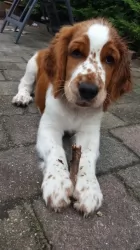 The breed is a medium size, solid and compact dog bred to work. Their forequarters are angled and there hindquarters are well developed. This is a very good looking breed that is only red with white markings. A hard working dog bred to hunt. They are slighter longer than tall and are not penalized as long as the height tis not greater than the length.
The breed is a medium size, solid and compact dog bred to work. Their forequarters are angled and there hindquarters are well developed. This is a very good looking breed that is only red with white markings. A hard working dog bred to hunt. They are slighter longer than tall and are not penalized as long as the height tis not greater than the length.
The tail in docked except in countries where it is illegal to do so. Their eyes should be brown. Noses are black or brown. The ears are small with a fethering like most setters. The show and field styles are the same. They are confused with the Engolish Springer Spaniel even though there are many differences. But both breeds are born to hunt and “spring” at the prey. They are smaller than the English Springer Spaniel and larger than the English Cocker Spaniel.
 The Red Heeler is a medium-sized dog standing at between 43 to 51 cm in height and weighing in the region of 14 – 16 kg.
The Red Heeler is a medium-sized dog standing at between 43 to 51 cm in height and weighing in the region of 14 – 16 kg.
He is muscular, with a sturdy build. The coat of this robust dog is shortish and thick and quite often you’ll find a white star marking on he forehead. The coat is a blue-grey color or reddish. The tail of this dog is long and the ears are erect.
The Red Heeler has always been a working dog so he is energetic and lively, being independent and strong-willed.
He is super intelligent too and can be easily trained and socialized. He is a dog that simply loves the outdoors and if you don’t live on a farm, he is going to need lots of exercise.
He gets on well with kids and other pets, but children should be taught to respect him and be kind towards him, otherwise he might not tolerate them. He is a loyal, protective dog, wanting to ensure the safety of his human family.
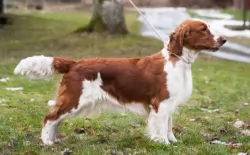 1Children friendliness yes they love their own children, but might be wary of others.
1Children friendliness yes they love their own children, but might be wary of others.
 When you bring a Red Heeler into your home, you must know that you’re never going to have a dull moment. They’re not content to lie around with nothing to do. These popular dogs literally coax you to come out and to be active.
When you bring a Red Heeler into your home, you must know that you’re never going to have a dull moment. They’re not content to lie around with nothing to do. These popular dogs literally coax you to come out and to be active.
Red Heelers need lots of activities and lots of room, so they aren’t particularly suited to life in the city. Large properties and plenty to do is what they ask for.
Your Red Heeler is going to make a splendid pet, loyal and devoted, the perfect example of man’s best friend.
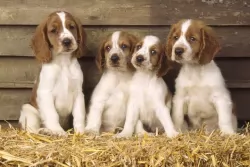 • Eye Diseases – Glaucoma can cause blindness; Entropian – eyelids curl inwards and can damage the cornea.
• Eye Diseases – Glaucoma can cause blindness; Entropian – eyelids curl inwards and can damage the cornea.
 Your Red Heeler can live to be 15 years of age with good care. Every dog however, can fall prey to some of the many common dog diseases there are, some of which can be -
Your Red Heeler can live to be 15 years of age with good care. Every dog however, can fall prey to some of the many common dog diseases there are, some of which can be -
There are quite a lot of congenital and inherited musculoskeletal disorders in dogs, with some of the more common ones being hip dysplasia and muscular dystrophy for instance.
There are some of these musculosceletal problems which can be fatal. Some of the typical symptoms you’ll see with these problems are difficulty climbing stairs or jumping, loss of muscle mass in the hind limbs, arthritis and lameness.
The retina of the eye is that light-sensitive part and which is part of the central nervous system. With retinal degeneration, the cells decline, leading to impaired vision and sometimes even blindness.
Some symptoms to look out for include dilated pupils, night blindness and the inability to see clearly in bright light. The disease worsens over times with sudden blindness being quite common with older dogs. Your vet will want a thorough history of your dog’s health.
Other dog diseases to be very aware of are cancer, obesity, bloat, hip dysplasia and epilepsy.
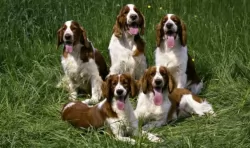 1Feeding the puppy active puppy. Feed breed specific or medium breed high quality dogfood. Feed ½ -3/4 cup in 2-3 meals
1Feeding the puppy active puppy. Feed breed specific or medium breed high quality dogfood. Feed ½ -3/4 cup in 2-3 meals
2.Feeding the adult active breed. Feed breed specific or medium breed high quality dogfood. Feed 1-1/2 cup in 1-2meals
4. Games and Exercises – Needs a secure fenced yard. Loves sports and outdoor activity. Agility, obedience, rally, tracking and loves to run, bike and hike.
 The Red Heeler is an active dog, and apart from walks which will give him the chance to sniff around, he will need lots of other forms of exercise. Rope pulling games he’ll love and running after a ball will please him because it takes him back to days when he used to run around and herd livestock.
The Red Heeler is an active dog, and apart from walks which will give him the chance to sniff around, he will need lots of other forms of exercise. Rope pulling games he’ll love and running after a ball will please him because it takes him back to days when he used to run around and herd livestock.
If you’re an outdoorsy type of person who loves hiking in the wilds and swimming in rivers, you can count this dog in.
You can look at the Red Heeler as a low maintenance dog. He does shed, but a good brush of the coat twice a week will be excellent for him. If he doesn’t wear his nails down naturally, you will need to trim them. Also, while you are brushing him, check his ears and eyes and inside his mouth to make sure he is clear of all infections.
Red Heelers rely on good food for their resilience and stamina, and for convenience it is good to have commercially manufactured dog food as a backup. The best is home-made food which is easy to prepare and totally uncomplicated.
Simply add into one big pot chicken, brown rice or pasta and spinach, sweet potatoes and carrots. This food can all be chopped up, refrigerated and added warmed up and in small portions to your pet's dry kibble once or twice a week. Simple and tasty, your Red Heeler will love it and thrive on it too.
Ensure there is always a bowl of fresh, cool water within his reach.